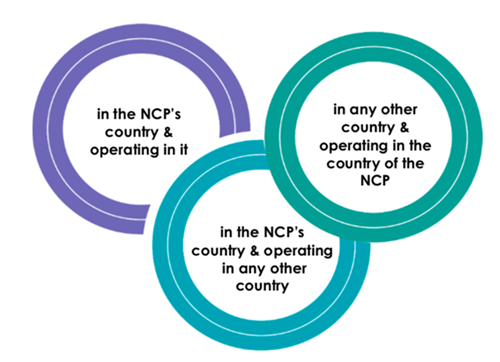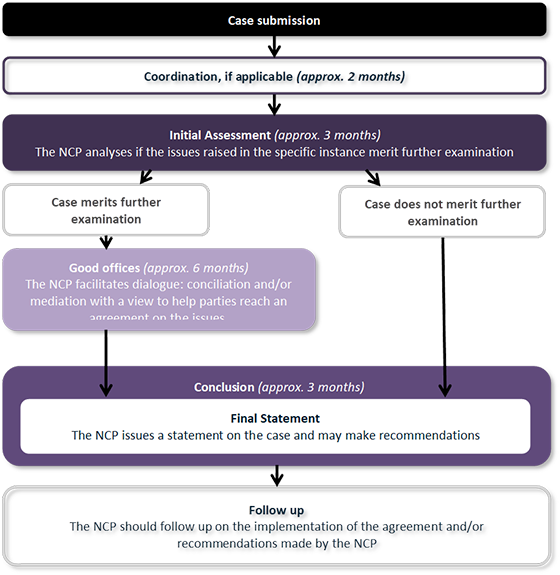How do NCPs handle cases ?
Are you an experienced mediator interested in assisting with NCP cases? |
|
The OECD maintains a roster of dispute resolution professionals to assist NCPs in the handling of specific instances under the OECD Guidelines for Multinational Enterprises. Specific instances are a non-judicial grievance process whereby the NCP contributes to the resolution of issues of alleged non-observance of the Guidelines by companies. Further information can be found in the FAQs. To participate in the roster, please fill out this document and email it to rbc@oecd.org. |
|
Who can submit a case?
Any individual or organisation with a legitimate interest in the matter can submit a case to an NCP regarding a company, operating in or from the country of the NCP, which has not observed the Guidelines.
What is the geographical reach of NCPs?
The Guidelines are addressed by adherent countries to ‘enterprises operating in or from their territories’ which enables NCPs to handle cases involving companies headquartered:
Over the past 20 years, NCPs have thus been able to handle cases in over 100 countries and territories, including over 50 that are not adherents to the Guidelines.
How to file a case within an NCP?
Filing a case within an NCP is very easy. Many NCPs provide a form to do so on their website. NCPs may however have different requirements in terms of the initial submission. To find out more about the specific requirements of an NCP, make sure to visit the NCP’s website where you will find all the information needed.
Is representation necessary?
It is not necessary to be represented by a lawyer when filing a case to an NCP or when engaging in the specific instance process as a company. This is however allowed, and in practice, submitters and companies can be represented or assisted by lawyers or other organisations such as NGOs or trade unions. BIAC, TUAC and OECD Watch are platforms of representative organisations that represent business, trade unions and civil society at the OECD, and may provide guidance or assistance in relation to specific instances.
Is there a fee for submitting a case?
No. As the NCP process is meant to be as accessible as possible, NCPs do not charge you when filing a case.
What can be expected from a NCP submission?
NCPs are not courts: participation in the process is voluntary and the NCP does not have the authority to order any remedy measure. What NCPs will do is offer their “good offices” to the parties and seek to facilitate an agreement between the submitter and the company through non-adversarial methods such as mediation or conciliation. Regardless of whether an agreement is reached, NCPs can make recommendations to the company with respect to the Guidelines. Some NCPs also make explicit determinations as to whether a company has observed the Guidelines or not in the case at hand. Most NCPs also follow up after the conclusion of the case to verify that any agreement and/or recommendations have been implemented. In practice, NCPs have been able to facilitate such remedies as monetary compensation, in-kind reparation, changes in company policy, etc. Browse examples of such cases.
Afraid of retaliation?
Submitters of an NCP case should not be subject to undue pressures or adverse consequences. This was restated by the OECD Working Party on RBC in March 2020. If you fear retaliation, the NCPs can take measures to protect your identity in the process. Make sure to inform the NCP of your situation in such a case. |
How do NCP handle cases?
NCPs follow a five-step process:
While all NCPs follow this overall process, there might be practical differences in the procedures followed by NCPs in practice. Make sure to visit the relevant NCP’s website to consult their rules of procedure.
Are cases public?
Yes. A record of all cases handled by NCPs is available online in the OECD database of specific instances. The database provides a summary of cases as well as links to final statements on cases published by NCP. Note that all ongoing cases might not be reflected in the database, as NCPs have discretion as to the moment they report a case for inclusion in the database.
Find out more from the Guides for NCPs on aspects of the specific instance process
|
Related Documents



